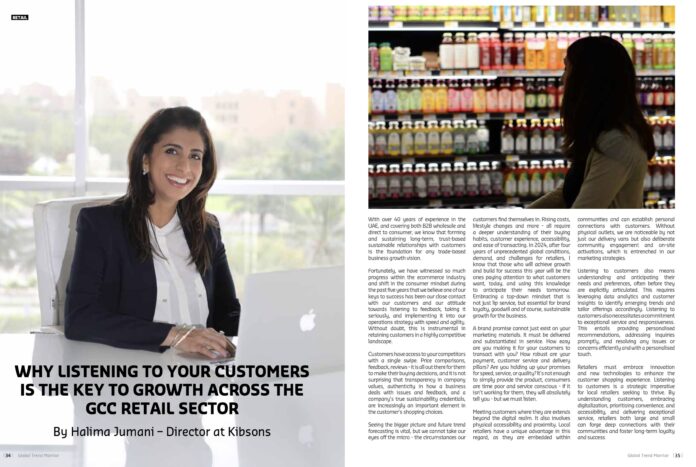Halima Jumani – Director at Kibsons
With over 40 years of experience in the UAE, and covering both B2B wholesale and direct to consumer, we know that forming and sustaining long-term, trust-based sustainable relationships with customers is the foundation for any trade-based business growth vision.
Fortunately, we have witnessed so much progress within the ecommerce industry and shift in the consumer mindset during the past five years that we believe one of our keys to success has been our close contact with our customers and our attitude towards listening to feedback, taking it seriously, and implementing it into our operations strategy with speed and agility. Without doubt, this is instrumental in retaining customers in a highly competitive landscape.
Customers have access to your competitors with a single swipe. Price comparisons, feedback, reviews – it is all out there for them to make their buying decisions, and it is not surprising that transparency in company values, authenticity in how a business deals with issues and feedback, and a company’s true sustainability credentials, are increasingly an important element in the customer’s shopping choices.
Seeing the bigger picture and future trend forecasting is vital, but we cannot take our eyes off the micro – the circumstances our customers find themselves in. Rising costs, lifestyle changes and more – all require a deeper understanding of their buying habits, customer experience, accessibility, and ease of transacting. In 2024, after four years of unprecedented global conditions, demand, and challenges for retailers, I know that those who will achieve growth and build for success this year will be the ones paying attention to what customers want, today, and using this knowledge to anticipate their needs tomorrow. Embracing a top-down mindset that is not just lip service, but essential for brand loyalty, goodwill and of course, sustainable growth for the business.
A brand promise cannot just exist on your marketing materials. It must be delivered and substantiated in service. How easy are you making it for your customers to transact with you? How robust are your payment, customer service and delivery pillars? Are you holding up your promises for speed, service, or quality? It’s not enough to simply provide the product, consumers are time poor and service conscious – if it isn’t working for them, they will absolutely tell you – but we must listen.
Meeting customers where they are extends beyond the digital realm. It also involves physical accessibility and proximity. Local retailers have a unique advantage in this regard, as they are embedded within communities and can establish personal connections with customers. Without physical outlets, we are noticeable by not just our delivery vans but also deliberate community engagement and on-site activations, which is entrenched in our marketing strategies.
Listening to customers also means understanding and anticipating their needs and preferences, often before they are explicitly articulated. This requires leveraging data analytics and customer insights to identify emerging trends and tailor offerings accordingly. Listening to customers also necessitates a commitment to exceptional service and responsiveness. This entails providing personalised recommendations, addressing inquiries promptly, and resolving any issues or concerns efficiently and with a personalised touch.
Retailers must embrace innovation and new technologies to enhance the customer shopping experience. Listening to customers is a strategic imperative for local retailers seeking to thrive. By understanding customers, embracing digitalization, prioritising convenience, and accessibility, and delivering exceptional service, retailers both large and small can forge deep connections with their communities and foster long-term loyalty and success.
